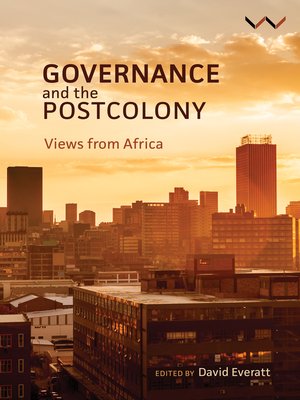
Sign up to save your library
With an OverDrive account, you can save your favorite libraries for at-a-glance information about availability. Find out more about OverDrive accounts.
Find this title in Libby, the library reading app by OverDrive.



Search for a digital library with this title
Title found at these libraries:
| Library Name | Distance |
|---|---|
| Loading... |
Civil society, NGOs, governments, and multilateral institutions all repeatedly call for improved or 'good' governance – yet they seem to speak past one another. Governance is in danger of losing all meaning precisely because it means many things to different people in varied locations. This is especially true in sub-Saharan Africa. Here, the postcolony takes many forms, reflecting the imperial project with painful accuracy. Offering a set of multidisciplinary analyses of governance in different sectors (crisis management, water, food security, universities), in different locales (including the African Union and specific regional contexts from West Africa, Zambia, to South Africa), and from different theoretical approaches (network to adversarial network governance, and beyond), this volume makes a useful addition to the growing debates on 'how to govern'. It steers away from offering a 'correct' definition of governance, or from promoting a particular position on postcoloniality. It gives no conclusion that neatly sums up all the arguments advanced. Instead, readers are invited to draw their own conclusions based on these differing approaches to and analyses of governance in the postcolony. As a robust, critical assessment of power and accountability in the sub-Saharan context, this collection brings together topical case studies that will be a valuable resource for those working in the field of African international relations, public policy, public management and administration.|Civil society, NGOs, governments, and multilateral institutions all repeatedly call for improved or 'good' governance – yet they seem to speak past one another. Governance is in danger of losing all meaning precisely because it means many things to different people in varied locations. This is especially true in sub-Saharan Africa. Here, the postcolony takes many forms, reflecting the imperial project with painful accuracy. Offering a set of multidisciplinary analyses of governance in different sectors (crisis management, water, food security, universities), in different locales across sub-Saharan Africa, and from different theoretical approaches (network to adversarial network governance); this volume makes a useful addition to the growing debates on 'how to govern'. It steers away from offering a 'correct' definition of governance, or from promoting a particular position on postcoloniality. It gives no neat conclusion, but invites readers to draw their own conclusions based on these differing approaches to and analyses of governance in the postcolony. As a robust, critical assessment of power and accountability in the sub-Saharan context, this collection brings together topical case studies that will be a valuable resource for those working in the field of African international relations, public policy, public management and administration.







